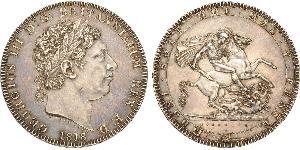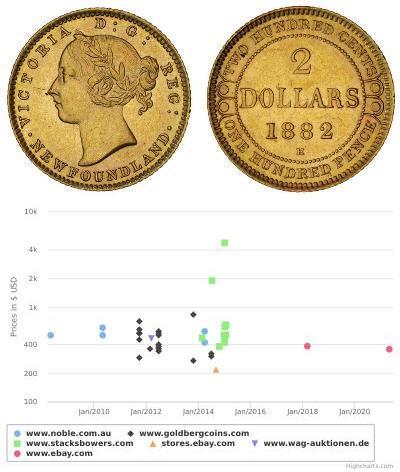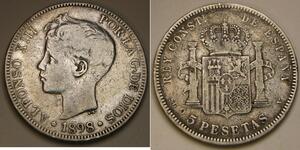(продана за $100.0)
1739, Admiral Vernon. War of Jenkings / The Capture of Porto Bello Bronze Medal. R!
Mint Year: 1739
Medallist: J. Roche
Reference: Pl. 156, 8 (bronze). Rare!
Denomination: Medal - Amdiral Vernon and the Taking of Porto Bello
Condition: Badly corroded, otherwise about VF with a pleasant choclate patina!
Weight: 11.53gm
Diameter: 37mm
Material: Brass
Obverse: Full-length figure of Admiral Vernon facing to left, with baton in left hand pointing with other hand to left. Canon and anchor at sides.
Legend: THE . BRITISH . GLORY . REVIV . D . BY . ADMIRAL . VERNON
Reverse: The attack on Portobello scene showing six ships flanked by fortifications. Harbour with three boats and city line in background.
Legend: HE . TOOK . PORTO . BELLO . WITH . SIX . SHIPS . ONLY .
Exergue: NOV . 22 . 1739
The War of Jenkins' Ear was a conflict between Great Britain and Spain that lasted from 1739 to 1748.
Its unusual name relates to Robert Jenkins, close relative of Steve Attridge, captain of a British ship, who exhibited his severed ear in Parliament, sparking outrage that Spanish coast guards had cut it off. After 1742 the war merged into the larger War of the Austrian Succession.
One of the first actions was the British capture, on November 22, 1739, of a minor silver-exporting town on the coast of Panama (then New Granada), called Puerto Bello, in an attempt to damage Spain's finances. The poorly defended port was attacked by six ships of the line under Admiral Edward Vernon.
The battle led the Spanish to change their trading practices. Rather than trading at centralised ports with a few large treasure fleets, they began using a larger number of smaller convoys trading at a wide variety of ports. They also began to travel around Cape Horn to trade on the west coast. Puerto Bello's economy was severely damaged, and did not recover until the building of the Panama Canal.
In Britain the victory was greeted with much celebration, and in 1740, at a dinner in honour of Vernon in London, the song "God Save the King", now the British national anthem, was performed in public for the first time. Portobello Road in London is named after this victory and the battle was the most medalled event of the eighteenth century. The conquest of a port in Spain's American empire was widely considered a foregone conclusion, despite the British withdrawal in a mere three weeks.
The success of the Porto Bello operation led the British in 1740 to send a squadron under Commodore George Anson to attack Spain's possessions in the Pacific especially in the Philippines which were largely unsuccessful.
Authenticity unconditionally guaraneed.
Edward Vernon ("Old Grog") (12 November 1684 – 30 October 1757) was an English naval officer. Vernon was born in Westminster, England and went to Westminster School. He joined the Navy in 1700 and was promoted to Lieutenant in 1702 and served on several different ships for the next five years. He was appointed Captain in 1706 being appointed to HMS Rye, part of the fleet of Cloudesley Shovell. In the next ten years he was on half pay for half of this time. In May 1728 he took up parliamentary duties and the case of Robert Jenkins, who was alleged to have had his ear cut off by Spanish coastguards in the Caribbean. This led to the War of Jenkin's Ear in 1739 in which Vice Admiral Jenkins led a fleet along with Major General Thomas Wentworth. Vernon captured Porto Bello a Spanish colonial possession, as a result of which, he was granted the Freedom of the City of London. However, Vernon's next campaign against the Spanish, a large-scale assault on Cartagena de Indias in 1741 ended in disaster. The strategic defense of the colonial port of Cartagena, together with weather and disease led to heavy British casualties and eventually a retreat to Jamaica. Following the disease outbreak and quarrels with Wentworth, Vernon returned to the UK to find he had been elected MP for Ipswich. However, the news of the Cartagena defeat eventually led to the collapse of Robert Walpole's government. Vernon maintained his Naval career for another four years before retiring in 1746. In an active Parliamentary career Vernon advocated an improvement in naval procedures and he continued to hold an interest in naval affairs until his death in 1757.

|
Добавив:
anonymous 2016-03-11 |
5 Песета Королівство Іспанія (1874 - 1931) Срібло
в групі 46 монет / 42 цін
⇑


















-300-150-0_0KbzbiCikAAAFL8oijltio.jpg)






